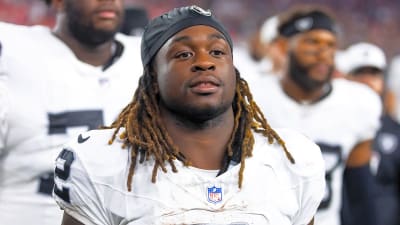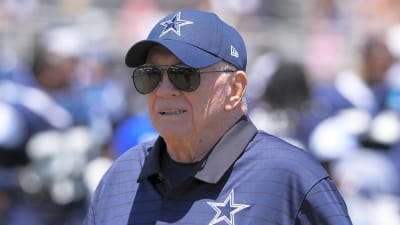LITTLE ROCK, Ark. — Arkansas athletics director Hunter Yurachek dropped at bomb at the Little Rock Touchdown Club, announcing Razorback athletics is considering venturing into the third lane of NIL, a visual coined by Yurachek where programs go out of their way to play on the shady side of the NIL world.
"Until we get our [college athletics NIL] enforcement agency up and running, you're going to contiue to have schools operating in that third lane and that's a bad place to be in my opinion," Yurachek said. "It's bad for college athletics. I don't want to operate there, but to be competitive, we may have to figure out what that third lane looks like for the University of Arkansas."
As he wandered over to be part of an interview with former Arkansas superstar David Bazzel, he openly opined "That's probably going to go national." However, there was nothing about his tone or demeanor that indicated he cares in that regard anymore.
Yuracheck described this point in time as a moment where they are still trying to get the speed limit signs up and everyone knows there are no cops on the roads to enforce the ones that are up.
"Let's all raise our hands," Yurachek said. "If you're driving down I-40 and the speed limit is 55, but you know a state trooper is not going to be out that day, how many of us are going to go 65?"
The Arkansas AD pushed back on the idea the Razorbacks have been unable to compete, citing how much better the athletics program is in all other sports outside of football than the rest of the SEC. From the standpoint of the big three, he said he feels basketball is set up for a legitimate shot at the national championship and that everyone has known for a while the baseball team is set up for a shot at the national title.
However, he knows so many people care about football, and freely admitted this is the one sport that isn't positioned to hold a No. 1 ranking or win at least an SEC championship. Yuracheck attributed that directly to money.
He said when he arrived, he found a budget of $120 million and wondered how he would spend all of that money after coming from a Group of Five school in Houston. Now he oversees a budget of $180 million and looks across a giant gulf at fellow SEC schools he says have $300 million in their operating budget while he cuts back on athletes getting to attend summer school classes and cutting positions within his offices.
This is why the Hogs are looking to step a toe into the gray areas of NIL. One example he gave is how other schools have reimagined how shoe contracts are done.
"Shoe deal money is now being used to endorse student athletes from NIL agreements, if that makes sense, where the shoe companies are now going to be instead of funneling the money directly to the schools, now they're going to be entering into an agreement with student athletes to wear their shoes," Yurchek said. "Technically [shoe companies] already had that agreement. Then, how you use your multimedia rights to funnel money to student athletes? And so the schools that have money are trying to find ways to continue to get that money to their student athletes so that they don't lose their competitive advantage."
Yurachek yearns for an NFL model where teams must stick to a salary cap alongside an NIL model that has agents getting commercial deals for their clients at above the table market rates. He says that would be ideal and settle college athletics into a more competitive state, but also indicated schools that are winning aren't going to give up their competitive edge for the good of all.
"If in our industry, we would stick to the revenue sharing piece and allowing student athletes and their agents and their parents whomever wants to go out and negotiate legitimate NIL agreements, college athletics would really be in a great spot, but we've already ventured out into this third lane where schools are figuring out new ways to provide that revenue," Yurachek said.
Hogs Feed:
More must-reads:
- Jose Mourinho returns to Benfica: A full circle moment for the 'Dark Lord of Football'
- Scout identifies key issue behind Arch Manning's underwhelming start
- The 'Switch-hitter single-season HR leaders' quiz
Breaking News
Trending News
Customize Your Newsletter
 +
+
Get the latest news and rumors, customized to your favorite sports and teams. Emailed daily. Always free!








